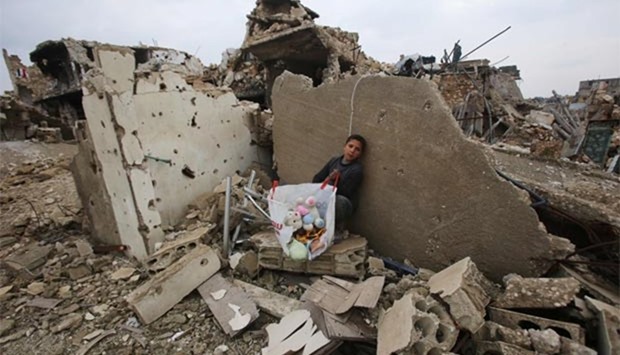Buses began entering the last rebel-held parts of Aleppo on Sunday to resume the evacuation of Syrian civilians and rebels, official media reported.
The operation had been suspended on Friday, a day after thousands of people had begun leaving the rebel enclave under a deal allowing the regime to take full control of the city.
Buses started entering several neighbourhoods on Sunday under the supervision of the Red Crescent and the International Committee of the Red Cross "to bring the remaining terrorists and their families out," state news agency SANA said, referring to the rebels.
The main obstacle to the resumption of the operation had been a disagreement over the number of people to be evacuated in parallel from two Shia villages, Fuaa and Kafraya, under rebel siege in northwestern Syria.
A rebel representative told AFP on Sunday that a new agreement had been reached under which the evacuations would take place in two phases.
"In a first step, half of the people besieged in Aleppo will leave, in parallel with the evacuation of 1,250 people from Fuaa," representative said on condition of anonymity.
According to the United Nations, around 40,000 civilians and rebels are trapped in the opposition-held sector of Aleppo.
"In a second step, 1,250 people from Kafraya will leave in parallel with the evacuation of the remaining people in Aleppo," the rebel representative said.
Another 1,500 people will later leave Fuaa and Kafraya along with the same number from Zabadani and Madaya, two rebel towns besieged by the regime in Damascus province.
Earlier, desperation mounted among thousands of hunger-stricken Syrian civilians trapped in Aleppo after their evacuation was delayed.
As international alarm grew over the plight of residents including women, children, the sick and wounded, the UN Security Council was to vote on whether to send observers to the battleground city.
An AFP correspondent who visited a hospital in the rebel sector saw appalling conditions with patients lying on the floor without food or water and almost no heating despite sub-zero temperatures at night.
Thousands of civilians and rebels had begun leaving Aleppo on Thursday under an evacuation deal allowing Syria's regime to take full control of the divided city after years of fighting.
But the operation was suspended the next day with both sides blaming each other.
The main obstacle to a resumption is a rift over the number of people to be evacuated in parallel from Fuaa and Kafraya, under rebel siege in northwestern Syria.
Under an agreement reached between Turkey, which backs the rebels, and regime allies Russia and Iran, those evacuations would take place at the same time as the Aleppo operation.
But differences remain over the number of people to leave the villages -- the rebels have agreed to 1,500 while Iran wants 4,000 people to be allowed out.
Al-Farook Abu Bakr, of the hardline Islamist rebel group Ahrar al-Sham, said a deal had been reached for the evacuations to resume and it was possible that they would happen on Sunday.
The UN Security Council was set to meet at 1600 GMT in New York to vote on French proposals to dispatch monitors to oversee evacuations and report on the protection of civilians.
The draft text said the council was "alarmed" by the worsening humanitarian crisis in Aleppo and by the fact that "tens of thousands of besieged Aleppo inhabitants" are in need of aid and evacuation.
"Our goal through this resolution is to avoid another Srebrenica in this phase immediately following the military operations," French Ambassador Francois Delattre told AFP, referring to a 1995 Bosnian war massacre.
But the proposals face resistance from veto-wielding Russia, a key backer of Syrian President Bashar al-Assad.
Families have been sheltering during the night in freezing temperatures in bombed out apartment blocks in Aleppo's Al-Amiriyah district, the departure point for evacuations before they were halted.
No food, water
Abu Omar said that after waiting outside in the cold for nine hours the previous day, he had returned on Saturday only to be told the buses were not coming.
"There's no more food or drinking water, and the situation is getting worse by the day," he said, adding that his four children were sick because of the cold.
Dozens of trucks with humanitarian aid crossed the Turkish border on Saturday into Syria, piling supplies in a buffer zone.
Aleppo has seen some of the worst violence of the nearly six-year war that has killed more than 310,000 people.
UN envoy Staffan de Mistura estimated that as of Thursday around 40,000 civilians and perhaps as many as 5,000 opposition fighters remained in Aleppo's rebel enclave.
The International Committee of the Red Cross (ICRC) appealed for safe passage for the civilians still trapped in the city.
"People have suffered a lot. Please come to an agreement and help save thousands of lives," said ICRC Syria delegation head Marianne Gasser.
"We cannot abandon these people."
A Turkish official said 90 wounded from Aleppo have crossed into Turkey for treatment since Thursday.
Before evacuations were suspended around 8,500 people, including some 3,000 fighters, left for rebel-held territory elsewhere in the north, said the Syrian Observatory for Human Rights.
On Friday, a convoy of evacuees that had already left east Aleppo when the operation was suspended was forced to turn back.
The ICRC, supervising the evacuations, said it was looking into reports of shooting before the convoy was turned around.
The main regional supporters of the rival sides in the devastating civil war have engaged in a flurry of diplomacy to try to secure a resumption of evacuations.
The official Iranian news agency IRNA said the foreign ministers of Russia, Turkey and Iran would meet in Moscow on Tuesday to discuss the conflict.

A Syrian boy sits with belongings he collected from the rubble of his house in Aleppo's Al-Arkoub neighbourhood on Saturday, after pro-government forces retook the area from rebel fighters.
